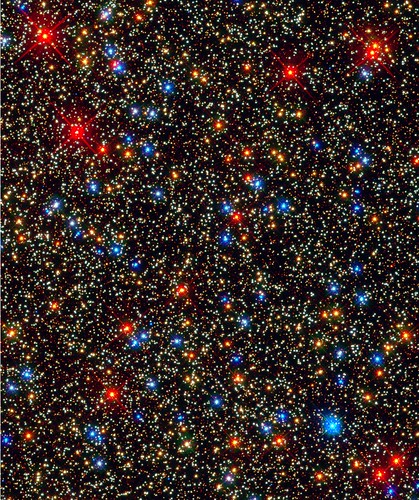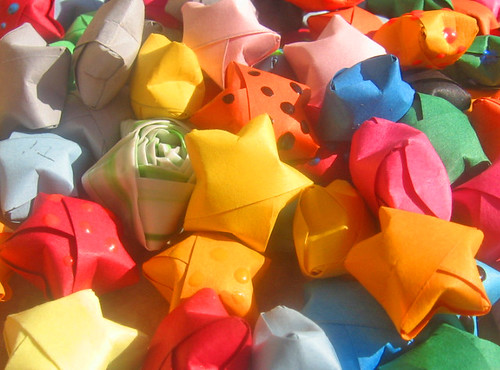 |
| Flickr Credit: GSFC |
2009, Rick Riordan publishes The Last Olympian, and I’m like, in seventh or eighth grade. I read it, and I love it, and I scribble it on my reading log in nearly indecipherable script. (De veras, I never realized how much my handwriting has changed in the last half-decade until I saw what a mess my writing used to be.)
Now, there was this 1-4 star scale on the Reading Log, which I actually attempted the first month I used it. Then I read The Maze of Bones, also by Rick Riordan, and gave it a 10. The Hunger Games got 150, North! Or Be Eaten got 2 million, Airhead got 11 million, Pandora of Athens got “like a gazillion,” The Emperor’s Code got a “centillion,” and The Lightning Thief and almost all subsequent books got infinity.
Then came The Last Olympian, and my poor little heart was filled with too much joy for infinity, so I’m sure you can guess what I rated it—“more than infinity.”
Yes, I still have those records.
What my 2009 self did not realize was that while infinity was very complementary towards Mr. Riordan’s books, I was completely devaluing every other book on my scale. Yeah, compared to a score of 2 (which I gave to Lord of the Flies) 2 million is a lovely score, but when you get up to 11 million and from there “more than infinity,” that’s not complementary at all!
As highly as I wanted to praise these books, I could only do so by shaming other books I’d read—some of which I truly loved.
When rating books, or anything, there always has to be a set scale. Amazon has a five-star scale, as does Facebook. IMDb uses a score out of ten, and Rotten Tomatoes gives a percentage out of 100. All things considered, each of these scales could be standardized to all match, and technically nothing would change, but I find that would take away some individuality, as well.
So where does that leave us? When creating a scale, we need three things:
1) Standardization—there must be a scale of some sort to encourage fair and easy comparisons, which will also demand specificity from the rater.
2) Simplicity—Infinity is a bad scale to go up to. It’s also hard to rate value based on electron content or whether it can pass rites of fire in your backyard. Make it easy to understand and easy to replicate, if necessary.
3) Individuality—What does each star (or number) mean? Is it like in school, where a 75% equals passing? Or as with Amazon, does 1 mean “I hated it,” 3 mean “I liked it,” and 5 mean “I loved it”? Will you choose an even scale, that demands choosing a side, or will you allow some gray area? How does this scale represent you, and what you believe about the content you’re reviewing?
Nowadays, I’m going on a five-star scale with a bonus question. It serves my purposes as a reader and watcher of movies, and it allows me to truly honor the media I love in reviews, and make sure I know what I want to return to.
Here’s what it looks like for books:
5—An amazing book, which I love and will remember fondly for years to come. Usually I identify with the characters, enjoy the plot, and admire the author’s choices for the text.
4—A good book, which is fun and interesting. It has good characters, a good plot, and there’s nothing wrong with it. It is simply a darn good book and I will enjoy rereading it.
3—An okay book, which was worth the read but imperfect. Maybe it wasn’t realistic, maybe it’s not my genre, maybe the plot was holey. I’d read it again, but I wouldn’t cry if I accidentally dropped it in the bathtub or something.
2—A poor book, which could have all sorts of problems, but isn’t completely past redemption. I’d reread it… probably.
1—Not worth reading again or I couldn’t finish it. Some books simply do not interest me or are so poorly written I can’t bother to see them through.
However, on my current reading logs, I don’t actually use this star system! That’s only for reviews on my other blog, Sometimes I’m a Story. When I’m putting books in my spreadsheet, I take into account one question:
Would I Read This Book Again?
To be willing to read a book again and again is, quite honestly, the highest praise I could ever give. If the answer is yes and I get stuck with varying degrees of quality, so be it. But I’ll save myself from the one-star books, and that is plenty for me.
What about you? How do you rate books? How does your system differ from mine?
 |
| Flickr Credit: Gabriel Lima |

I love this post! "More than infinity" ... well, I can understand little Heather, even if I wouldn't use such a rating myself. :) The Last Olympian did blow me away.
ReplyDeleteMy three stars is a pretty decent rating. It works better for me that way because I tend to like more books than I dislike.
XD I actually forgot I had written it until I got the email alerting me to your comment. And yes, I am a little bit embarrassed by my former self, and The Last Olympian was very good, especially back then.
Delete*nods* That works well. I think I tend to dislike books a little more (maybe?) and so that's why we have to personalize our rating systems! The inequality makes for personal awesomes.